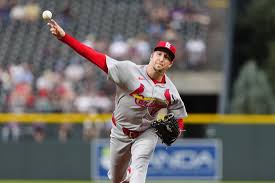A Desperate Deal: Braves acquire Erick Fedde in search of a healthy arm
NEWSOTHER NEWSSPORT
7/28/20254 min read


In a move that speaks volumes about their current state of affairs, the Atlanta Braves have acquired veteran right-handed pitcher Erick Fedde from the St. Louis Cardinals.1 The trade, announced Sunday, sees the Braves taking on a struggling arm in exchange for a player to be named later or cash considerations. The Cardinals will also send cash to Atlanta as part of the deal, reportedly covering most of Fedde's remaining salary for the 2025 season. This transaction, which comes on the heels of the Cardinals designating Fedde for assignment, is a stark reminder of the Braves' catastrophic injury woes and their desperate search for innings-eaters.
To put it bluntly, the Braves' starting rotation is in shambles. In a truly remarkable and unfortunate turn of events, every single pitcher from their Opening Day rotation is now on the injured list. The list is long and painful: Chris Sale (fractured rib cage), Reynaldo Lopez (right shoulder surgery), Spencer Schwellenbach (fractured elbow), A.J. Smith-Shawver (strained elbow), and now Grant Holmes, who was moved to the 60-day injured list to make room for Fedde on the 40-man roster.2 Braves manager Brian Snitker, facing a roster decimated by injuries, summed up the situation best: "We're going to figure out a way and piece this thing together. That's all you can do, 'cause the games aren't going to stop because we lost our rotation."
Enter Erick Fedde. The 32-year-old right-hander is a far cry from an ace, and the Cardinals' decision to designate him for assignment speaks to his recent performance. Fedde has a 3-10 record with a 5.22 ERA in 20 starts this season, and his last few outings were particularly brutal.3 In his final five starts with the Cardinals, his ERA ballooned to a staggering 13.25. Once a highly-touted prospect with the Nationals, Fedde found new life in the KBO in 2023, where he dominated the league with a tweaked pitch mix.4 This led to a two-year, $15 million deal with the White Sox for the 2024 season. He had a solid campaign in 2024, posting a 3.30 ERA across 31 starts for the White Sox and Cardinals, which is why the Cardinals were so high on him coming into this year.5 However, that success has not carried over into 2025.
For the Braves, the move is less about acquiring a top-tier pitcher and more about simply adding a healthy arm to their roster. They are well out of contention in the playoff race, with a 44-60 record, and their focus is now on finding a way to get through the remainder of the season. Fedde, despite his struggles, has proven to be a durable pitcher in the past, having made at least 27 starts in each of the past four seasons. The hope is that a change of scenery and a less-pressurized environment will allow him to eat innings and provide some semblance of stability to a rotation that desperately needs it. With the Cardinals covering most of his salary, the financial risk for Atlanta is minimal.
The trade also serves as a bookend to a curious and ultimately disappointing chapter for the St. Louis Cardinals. They acquired Fedde at the trade deadline last season in a three-team blockbuster deal that saw them part with utilityman Tommy Edman, who went on to win the NLCS MVP with the Dodgers. The Cardinals' hope was that Fedde would be a reliable, back-of-the-rotation presence for the rest of 2024 and all of 2025. While he was serviceable last year, his performance this season has been a significant step backward. His struggles with command and a penchant for giving up hard contact led to his eventual designation for assignment.
For the Cardinals, this deal marks the beginning of what is expected to be a selling period before the upcoming trade deadline. While they are on the fringes of the wild-card race, the team's recent struggles (seven losses in their last 10 games) and the presence of several other veterans on expiring contracts make a "fire sale" seem all but inevitable. By trading Fedde, they are clearing a rotation spot and getting some cash relief, albeit for a meager return. The fact that the Cardinals had to pay a team to take a pitcher they acquired just a year ago for a key player is a tough pill to swallow for the organization and its fans.
As for Fedde himself, the trade provides a much-needed fresh start. Following a particularly rough outing against the Rockies, he publicly acknowledged his poor performance, stating, "The truth is I've been awful and I'm putting the team in terrible spots... Confidence, for sure, an all-time low." The opportunity to pitch for a team with no playoff aspirations and a desperate need for innings could be exactly what he needs to reset. He can focus on finding his form without the pressure of a postseason push. A strong finish to the season could help him secure a new contract as a free agent this offseason, and perhaps even put him on the Braves' radar for a return in 2026 if their injury situation persists.
Ultimately, the trade is a classic example of a team selling low on a player who didn't work out and another team, facing a dire situation, taking a low-risk gamble on a player with a history of being a serviceable innings-eater. The Braves are not trading for an ace, they are trading for a warm body with a pulse and a rubber arm. While Fedde's performance this season has been concerning, the Braves' current situation is so dire that any pitcher who can take the mound and get through a few innings is a welcome sight. It's a deal born of desperation, but for a team that has seen its rotation completely collapse, even a small glimmer of stability is a significant win.
